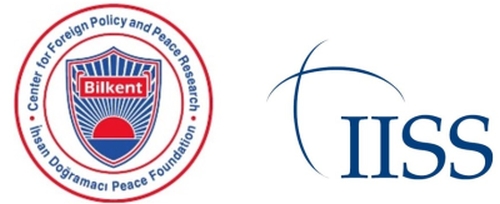
© picture alliance / AA | Serhat Cagdas

© picture alliance / AA | Serhat Cagdas

Institutes:
Center for Foreign Policy and Peace Research (CFPPR),
The International Institute for Strategic Studies (IISS)
Project Members:
Çağlar Kurç, Research Fellow, CFPPR; Assistant Professor, Abdullah Gul University
Bastian Giegerich, the Director of the Defence and Military Analysis Programme, IISS
Tom Waldwyn, Research Associate for Defence Procurement, IISS
Fenella McGerty, Senior Fellow for Defence Economics, IISS
Haena Jo, Research Analyst for Defence and Military Analysis, IISS
James Hackett, Senior Fellow for Defence and Military Analysis, IISS
Arda Mevlütoğlu, Board Member, Institute for Future Research (IFR)
Sıtkı Egeli, Associate Professor of International Relations, Izmir University of Economics
Serhat Güvenç, Professor of International Relations, Kadir Has University
Project Duration: Sep 23 - Nov 24
Contact:
Çağlar Kurç, email: caglar.kurc@agu.edu.tr
Tom Waldwyn, email: tom.waldwyn@iiss.org
This project explored prospects for cooperation and competition between the European and Turkish defence industries, as well as the impact of defence industrial relations on the foreign policies of Turkey, the European Union (EU), and selected non-EU European countries. Such an examination was important because cooperation in the defence realm was conventionally believed to generate positive externalities in other areas of politics. Hence, closer defence industrial cooperation between Turkey and Europe, while significant for the defence of Europe, including from a NATO perspective, might have also helped the relevant parties rebuild confidence in each other.
Although Turkish-European defence industrial cooperation had produced mixed results, several factors appeared to tilt the scales in favour of more positive collaboration. These included increased European defence spending following Russia’s invasion of Ukraine, Turkey’s desire to improve the sustainability of its defence industry by joining European projects, mutual attempts to enhance relations through defence programmes, and concerns over the sustainability of Turkey’s relations with Russia.
With that context in mind, the project addressed the following questions. First, how did the Russo-Ukrainian War alter the strategic calculations in Europe? Second, what were the impacts of the war on European defence industrial policies? Third, how had European defence industrial cooperation evolved over the years through institutions such as the IEPG, WEU, OCCAR, EDA, and PESCO? Fourth, what were the main drivers behind these changes? Fifth, how had Turkey contributed to and acted (or failed to act) as a stakeholder in European defence cooperation in the past? Sixth, how could the Turkish defence industry contribute to European security? Seventh, was Turkey’s goal of self-sufficiency achievable, and if not, what changes might have been foreseen in Turkish defence industry policy? Eighth, what were the expectations of Turkish defence companies regarding Turkish foreign policy? Ninth, how did the Turkish defence industry perceive Turkey’s foreign relations with the EU, Russia, and the U.S.? Tenth, did Turkey have a military-industrial complex with sufficient clout to influence policymaking? And finally, what did European defence companies expect from their respective countries and the EU in relation to Turkey?
in: Defence Studies, pp. 1–24, 05.03.2025
doi:10.1080/14702436.2025.2472705
morein: International Institute for Strategic Studies (IISS), Final Report, 13.11.2024 (online)
morein: International Institute for Strategic Studies (IISS), Research Paper, 11.09.2024 (online)
morein: International Institute for Strategic Studies (IISS), Research Paper, 29.07.2024 (online)
morein: International Institute for Strategic Studies (IISS), Research Paper, 14.06.2024 (online)
morein: International Institute for Strategic Studies (IISS), Research Paper, 01.05.2024 (online)
more